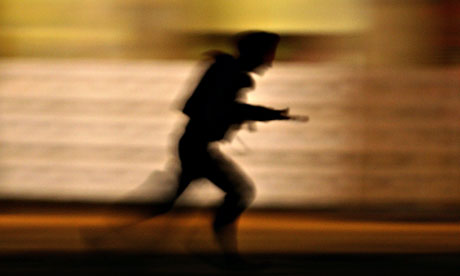WikiLeaks cables: Britain 'over-reacted' in wake of Mumbai attacks
Fears that India would respond with force to terrorist atrocity played down by American diplomats in US embassy cables

British diplomats feared that India would be compelled to respond "with force" to the 2008 Mumbai attacks, a prediction that was dismissed as an "over-reaction" by their American counterparts, the state department cables show.
British officials had evidence that Lashkar-e-Taiba (LeT), which carried out the attacks, "was planning more attacks", and speculated that Indian officials "will feel the need to respond with force rather than diplomacy".
The then foreign secretary, David Miliband, struggled to get through to his furious Indian counterpart, Pranab Mukherjee, in the aftermath of the attacks. "The call took place only after many delays on the GoI's part," a cable notes. In Islamabad, British officials feared that intense domestic pressure would force Delhi to respond, at the minimum, by ramping up covert support to nationalist militants fighting the Pakistani army in Balochistan, and at worst by launching air strikes against militant training camps in Pakistani-controlled Kashmir.
British officials admitted their concern was driven in part by the presence of 500,000 British Pakistani citizens in Pakistani Kashmir. "The pressure on India to react strongly would be politically impossible to avoid," they were reported as saying.US officials took a cooler view. "For now, we believe the UK embassy here is over-reacting," said the cable, but agreed that Pakistan should take proactive actions against LeT.
As it turned out, the Americans were right. But over the following weeks the British continued to engage in intense shuttle diplomacy, using diplomatic and intelligence channels to ease tensions between the two countries.In mid-December, Miliband and the high commissioner to Islamabad, Robert Brinkley, pressed Pakistan's intelligence chief, General Shuja Pasha, to visit India – a controversial suggestion that was quickly discounted.
"It would not be possible, said Zardari, to send Pasha immediately as Zardari needed to work public opinion first," said an American report. Instead President Asif Ali Zardari urged the UK to "push back on New Delhi and calm the situation"."Miliband said they would do so, but India needs to see real action from Pakistan."
Across the border in New Delhi, western diplomats meeting to assess the attacks collectively decided to offer a sympathetic public message to India "rather than pound on the government for its massive intelligence failure".
The British fears of "ramped-up" Indian aid to militant nationalists in Balochistan highlights an assertion found elsewhere in the cables: that British intelligence strongly believes New Delhi is covertly supporting the insurgency in reaction to alleged Pakistani support for LeT.
ends
http://www.gerrymccannsblogs.co.uk/PJ/KATERINA-PAYNE-INCIDENT.htm
The McCanns refused to hand over Madeleines medical records...with the releasing of the news that JonBenet was an abused child we have to now ask was Madeleine McCann an abused child and if she was why is the might of the British Goverment covering it up ?
